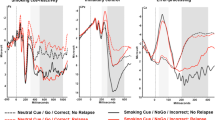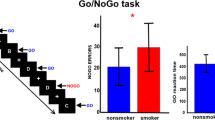Abstract
Rationale: Tobacco smoking is the most prevalent type of substance abuse, yet its biobehavioral etiology is little understood. Identification of differences between smokers and non-smokers on basic characteristics of neurocognitive functioning may help to elucidate the mechanisms of tobacco dependence. Objectives: This study assessed the relationship between smoking status and the P300 component of event-related potential (ERP) while controlling for potential confounders such as alcoholism, drug abuse, and psychopathology. Methods: The ERP responses elicited by a visual oddball task were measured at the mid-parietal site in 905 current smokers, 463 ex-smokers, and 979 never smokers. Results: P300 amplitude was significantly lower in current cigarette smokers compared to never-smokers. Ex-smokers did not differ significantly from never-smokers. P300 reduction was also associated with alcoholism, drug dependence, and family density of alcoholism. However, after controlling for smoking, only family density of alcoholism remained a significant predictor of P300 amplitude. Conclusions: The results indicate a significant effect of smoking status on P300 amplitude which is additive to family history of alcoholism and suggest that either (1) long-term tobacco smoking may produce a reversible change in brain function, or (2) reduced P300 may be a marker of risk for nicotine dependence.
Similar content being viewed by others
Author information
Authors and Affiliations
Additional information
Received: 20 October 1999 / Final version: 5 January 2000
Rights and permissions
About this article
Cite this article
Anokhin, A., Vedeniapin, A., Sirevaag, E. et al. The P300 brain potential is reduced in smokers. Psychopharmacology 149, 409–413 (2000). https://doi.org/10.1007/s002130000387
Issue Date:
DOI: https://doi.org/10.1007/s002130000387




